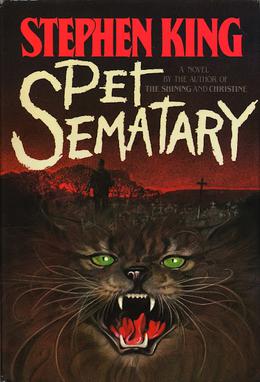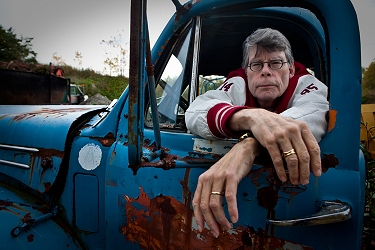Older and Wiser:
Going Back to the…
Pet Sematary

It’s funny, isn’t it, how something you read so many years ago can have a completely different feel when you return to it.
This has been true of most of those early Stephen King novels that I’ve been revisiting of late…but none more so than with his 1988 Pet Sematary.
I was in my twenties when I first stumbled across that clearing in the Maine woods. That odd patch of ground where for generations the children of the town of Ludlow had buried their little friends.
“SMUCKY THE CAT, one crate-board marker proclaimed. The hand was childish but careful. HE WAS OBEDIENT. And below this: 1971 – 1974. A little way around the outer circle he came to a piece of natural slate with a name written on it in fading but perfectly legible paint: BIFFER. And below this a bit of verse that made Louis grin. Biffer, Biffer, a helluva sniffer / Until he died he made us richer.
Back then, Death was still a mystery to me. Well, as far as having a…personal relationship with it. Death, which King names here with harrowing and perfect accuracy as Oz the Gweat and Tewwible. Like something a kid would say.
Oz the Great and Terrible. Indeed. Pull aside the veil that’s hiding its true face and what is really pulling the strings?
Back then I read it with some glee, seeing it almost as an old EC horror comic come to life; which, I guess, either shows me to have been a terribly insensitive young man or an innocent one. Maybe a bit of both.
Fast-forward three decades and I’m on more of a nodding acquaintance with Oz the Great and Terrible these days, his avatar Death having now knocked for those close to me on more than one occasion.
Reading now this extraordinary meditation on the transience of things, all I could feel was a deep, heart-rending sadness for those things and people that pass from our lives far too quickly. One gets the feeling that this was also in King’s mind when he was writing it.
There is a wonderful passage where Louis speculates on the young head-turner that old Norma Crandall must have been. It is one of several where he makes us aware that these are real people, with their own real history.
Frontiers of the Mind
Lou Creed (there’s even a joke about the Velvet Underground’s own Rock ‘n’ Roll Animal in here) has relocated his family from Chicago to this small town, situated near to where he is to take up a job as a University doctor. His house is just New-England-beautiful, complete with two wonderful neighbours in Jud and Norma Crandall; and the 83-year old becomes a father figure to him, he having lost his own father at three. And as King’s own father had left when he was the same age, this is one of several areas where autobiography may be intended.
It’s Jud that first takes Louis, Rachel and their children Ellie and Gage to the Pet Sematary (and how quickly it seems that the mis-spelling is the true one). It is located by following a path behind the house which is tended by the town’s children and which in turn – if you can cross over the barrier of fallen guardian trees – leads on to the real graveyard, an ancient Micmac Indian ground on the surface, but in reality something much, much older. And the path to the pet sematary and then over the barrier to the deeper secrets becomes almost symbolic of the spiraling path into insanity that Louis is embarking on.
Because when buried in the real cemetery, the dead can come back to life. But not as they were; no, not as they were.
King here also indicates the short area of space that we can all travel before moving from our own relatively ‘safe’ lives into territory that is as primitive as our minds can sometimes be:
“Jud jerked a thumb back over his shoulder. ‘Plenty of stuff that way,’ he said. ‘That’s town. This way, nothing but woods for fifty miles or more. The North Ludlow Woods they call it here, but it hits a little corner of Orrington, then goes over to Rockford. Ends up going on to those state lands I told you about, the ones the Indians want back. I know that it sounds funny to say your nice little house there on the main road, with its phone and electric lights and cable TV and all, is on the edge of a wilderness, but it is.’ […]
“’You can see everything,’ Rachel said in a low, awed voice. She turned to Louis. ‘Honey, do we own this?’
“And before Louis could answer, Jud said: ‘It’s part of the property, oh yes.’
“Which wasn’t, Louis thought, quite the same thing.”
The book’s events move forward with a sense of dread and inevitability, heightened by the author’s own oft-used moments of foreshadowing. We know, with a sense of dread, that when the family cat is run down whilst the mother and children are away, that Louis will make use of the graveyard – and that it won’t stop there. A malign influence seeps from those woods and infects – and I think that is the right word, for sure – each of the main characters.
The Sublime Idiocy of Youth
Good Lord, how could I have been so naïve as to find this a simple entertainment when I first read it? I must have been one hell of a slow learner.
There are so very many passages that haunt the mind, not least when the deranged-with-grief Louis is actually digging up his dead son, wiping the wet grave-moss from his cheeks.
And yet it is also here that we remember how damned inappropriately funny King can be, like that laughter that we’ve all used at the wrong time:
“Now he would have to climb, and just hope no one happened to glance away from the Carson Show long enough to see him monkeying up the wrought-iron like the world’s oldest, slowest kid.
– Hey, police? I just saw the world’s oldest, slowest kid climbing into Pleasantview Cemetery. Looked like he was dying to get in. Yeah, looked like a grave matter to me. Kidding? Oh no, I’m in dead earnest. Maybe you ought to dig into it.”
Unexpectedly, some of Stephen King’s finest writing is on show here. And so much of that writing is low-key and understated, all the more effective for it.
There is even one sequence where I wonder if he was aware that he is almost imitating the famous opening paragraph to Shirley Jackson’s The Haunting of Hill House, much loved by him.
“And then the house stood empty in the May sunshine, as it had stood empty on that August day the year before, waiting for the new people to arrive…as it would wait for the other new people to arrive at some future date, a young married couple, perhaps, with no children (but hopes and plans). Bright young marrieds with a taste for Mondavi wine and Lowenbrau beer; he would be in charge of the Northeast Bank’s credit department, perhaps, she with a dental hygienist’s credential or maybe three years’ experience as an optometrist’s assistant. He would split half a cord of wood for the fireplace, she would wear high-waisted corduroy pants and walk in Mrs. Vinton’s field, collecting November’s fall grasses for a table centerpiece, her hair in a ponytail, the brightest thing under the gray skies, totally unaware that an invisible Vulture rode the aircurrents overhead. They would congratulate themselves on their lack of superstition, on their hardheadedness in snaring the house in spite of its history – they would tell their friends that it had been fire-sale priced and joke about the ghost in the attic and all of them would have another Lowenbrau or another glass of Mondavi and perhaps they would play backgammon or Mille Bourne.
“And perhaps they would have a dog.”
The Jackson reader almost expects King to finish with: “And whatever walked there, walked alone.”
Pet Sematary is a very different, a very personal King novel. And I’m a very different person to the one who first encountered it. Oz the Great and Terrible isn’t so well hidden behind the curtain, these days.
And whereas in the eighties I was nothing less than indestructible, now I’m more aware that some day I’ll also feel that cold hand on my shoulder and hear that gravel-filled voice whispering: “Darling.”


Recent Comments